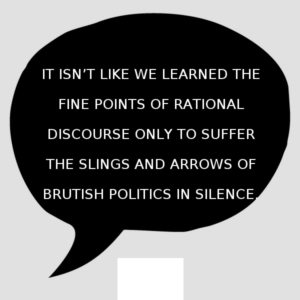 While current claims that the USA has never been more divided may be a tad hyperbolic—the Viet Nam war era comes to mind—these certainly are polarized times, and they may become more polarized in the months and years ahead. Straddling political divides to support higher education philanthropy is difficult when the political fracture of the day is top of mind for colleagues and community members alike. Your own political feelings may careen from despondent (or triumphant) to angry in the course of a single tweet. That’s the way of the world right now.
While current claims that the USA has never been more divided may be a tad hyperbolic—the Viet Nam war era comes to mind—these certainly are polarized times, and they may become more polarized in the months and years ahead. Straddling political divides to support higher education philanthropy is difficult when the political fracture of the day is top of mind for colleagues and community members alike. Your own political feelings may careen from despondent (or triumphant) to angry in the course of a single tweet. That’s the way of the world right now.
My experience tells me that the best policy is to lead with mission in polarized times. And our mission is simple: helping students enrolled in higher education. When impolitic messages are expressed you can pivot with a statement like, “My concern is with our students, and one thing I know is they will need more resources, support, and superior education experiences to make it in this world.”
We are lucky to have a mission as inclusive as students in higher education because our mission is nearly universally respected by people of all political persuasions. That allows us a little breathing room in divided arenas as long as we keep the focus where it needs to be, on the mission we serve.
I know it can get complicated. I have spent many years of my life in the company of CEOs, wealthy donors, small business owners, and successful professionals. I have heard thousands of directly political assertions that I have had to either sidestep or respond to with well-crafted noncommittal statements of one sort or another. It can wear on a person. Yet, we cannot make assumptions about the political leanings of a prospective or active donor. Money comes in all political stripes.
With board members, we might learn to encourage a little more comity (not comedy, although it bit of levity might help) in awkward times. I have had the experience of working with boards that shared tacit political biases, and I don’t think that’s right. I think the need for board diversity alone argues against that. When I see a board that leans 90% toward an identified political party, that’s a problem.
People give where they feel their contributions make a difference—and they give, and serve, where they feel welcome. In sharply divided political times a board chair or president may need to—rarely, we hope—ask a group to table remarks or a discussion or continue it outside of any institutional context.
But foundation executive directors and development officers may sometimes need to respond to unprofessional remarks by stifling themselves in the interest of promoting overarching philanthropic goals. I am not talking about hate speech, overtly offensive racist or misogynist remarks here. Those need to be documented and reported to the proper institutional authorities, because they directly threaten the mission of the institution. Thankfully, those comments as heard in a professional context are rare in my experience.
In these hig hly charged times it can be excruciating to stifle oneself. It isn’t like we learned the fine points of rational discourse only to suffer the slings and arrows of brutish politics in silence. But work is work. We are paid to cultivate gifts to the institution to further its mission, and that must be our higher calling, at least for the 10 hours a day we are on duty.
hly charged times it can be excruciating to stifle oneself. It isn’t like we learned the fine points of rational discourse only to suffer the slings and arrows of brutish politics in silence. But work is work. We are paid to cultivate gifts to the institution to further its mission, and that must be our higher calling, at least for the 10 hours a day we are on duty.
Off duty, especially in a small town, can also be a minefield. And while we do not take the vows of political chastity journalists must adhere to, high profile political engagement carries its own career risks. That is not fair, but there it is.
It is assumed that development professionals will work with donors of divergent political views. Some of those will be strident. We need to lead with mission at all times in the face of charged political emotion. The more we can promote the comity of big-tent philanthropy, the better chance we have of preventing push from coming to shove in our professional lives. But sometimes it arrives anyway. Perhaps that is a topic for another day, one that comes under the header of crisis management.
In the meantime, we may be in for heightened political tensions for the long haul, so setting positive, well-framed precedents right now is imperative. And leading with mission is never a bad thing. It is a proud tradition; one that can serve to unify divided communities in difficult times. I wish my fellow practitioners the very best in that endeavor.
Sidebar:
“Comity,” according to Merriam-Webster
- 1 a : friendly social atmosphere : social harmony <group activities promoting comity> <bipartisan comity in the Senate> b : a loose widespread community based on common social institutions <the comity of civilization> …
- 2 : avoidance of proselytizing members of another religious denomination
“Stand for your mission,” is an image belonging to standforyourmission.org. Check it out.